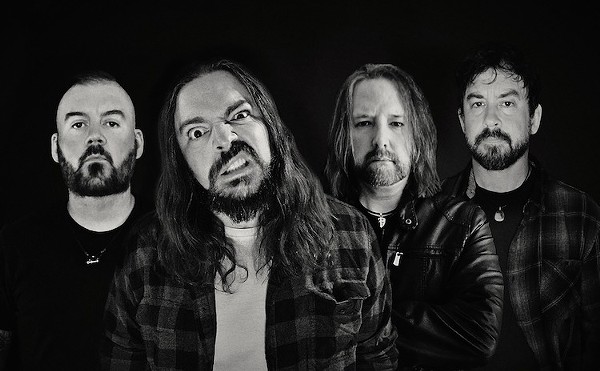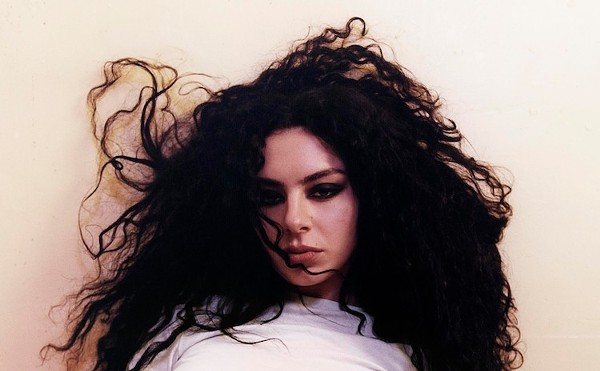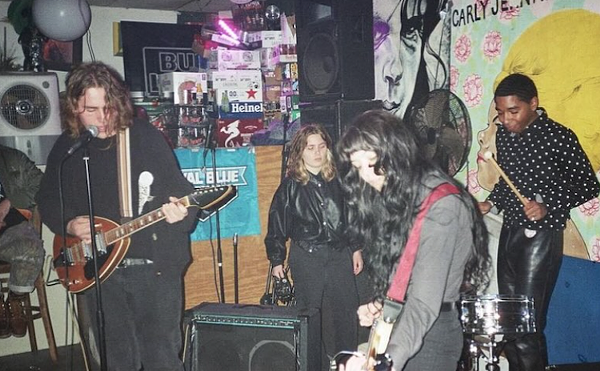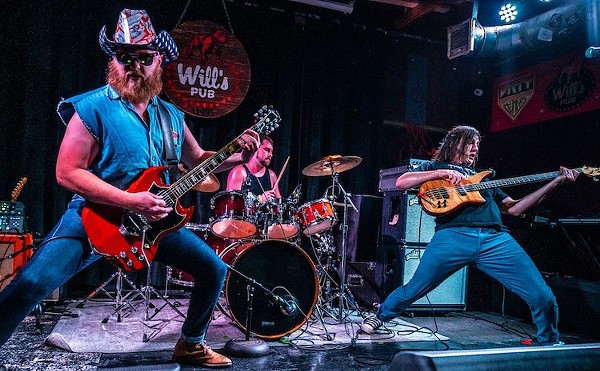Four songs into "Iron Flag," the Wu-Tang Clan's fourth album, the eight-man crew steers your ears down one of its trademark streets of beats gone wild. Against a background of party sounds laid out by production guru Robert "RZA" Diggs, "Soul Power" struts around the block like the local big man. Sporting more personalities than Zelda Fitzgerald, the Wu MCs erupt with the verbal flamboyance for which they are renowned: Raekwon's rapid-fire elision, Masta Killa's laid-back grit, Ghostface Killah's silky-smooth sparkle, U-God's streetwise stream-of-consciousness surrealism. Between each verse, "Power" flowers into a fist-pumping chorus that's peppered with the unmistakable flair of Flavor Flav. And it culminates with Method Man and Flav exchanging some friendly chitchat about the Long Island neighborhoods from which they came.
It all adds up to the Wu's usual roughneck panache. Nearly nine years since its 1993 debut, "Enter the Wu-Tang Clan (36 Chambers)," there's no question that the group can still bring the motherfucking ruckus. (In fact, they're scheduled to bring it to the House of Blues on Feb. 23.) The trouble is that it doesn't hit as hard as it used to, and that leaves you wondering if the Wu-Tang Clan is still the heavyweight champ of hardcore rap.
"Iron Flag" itself betrays no weakness (unless you count the absence of Ol' Dirty Bastard, who's still behind bars). The new album is packed with the sonic elements that made Enter and subsequent releases "Wu-Tang Forever" (1997) and "The Wu" (2000) unique listening experiences. RZA's production lends a cinematic gloss to the albums, but unlike other narrative-minded hip-hop producers such as Prince Paul or Dan the Automator, RZA is more interested in texture than cleverness. The Wu soundscape is distinctly dark, draping a film-noir contrast over the colorful exuberance of the low-budget '70s blaxploitation and kung-fu flicks that RZA often samples. This mood infuses the music with a sense of urban urgency. Sirens and horns wail in the background. Fragments of music that traverse the history of pop color a melody here, underscore a chorus there. The metal-on-metal bite of slide-action handguns signals a tempo change. And semiautomatic rat-a-tat-tats pan from left to right, putting you in the middle of the bullets' flight.
Yet the Wu's magic lies in taking RZA's hard-edged backgrounds and bending them into bouncing -- and occasionally bizarre -- songs. On the surface, "Iron"'s lead single, "Uzi (Pinky Ring)," is a clichéd "we're-back" boast about living large with money, bitches and blunts. But that theme is undermined by the off-the-wall rhymes the MCs spit out. A gangsta's typical ghetto-fabulous vocabulary abounds -- the usual chatter about Uzis, Bacardi, drugs, etc. -- but the MCs place these bon mots in nonsensical lines. Ghostface Killah delivers, "On the beach truck, stuck with Hawaiian ice/ Diamond twice the whole city thought I bought FUBU/ Blew you, authentic doodoo, picture the fog iced out/ Eighteen-karat rap between noodles," with all the venom of a verbal beat down. But when you hear it you're not sure if you're supposed to laugh or follow his logic -- about whatever he may be talking about.
That's the Wu's wonder -- blending reality and comedy, flexing its mind as much as its muscle. But it also marks everything the group does, which lately has been far too much. In 2001 alone, RZA's second Bobby Digital release, "Digital Bullet," was a surprisingly hazy and murky wash of low-tech beats from the producer's futuristic alter ego. Ghostface Killah recently dropped "Bulletproof Wallets," also featuring Raekwon, wherein the pair dish out the sort of wide-bodied soul-rap found on Ghost's 2000 release, "Supreme Clientele." And Method Man recently teamed up with his "How High" co-star Redman for the movie's soundtrack, revisiting their blunt-centric 1999 outing, "Blackout!"
It's understandable that the members of an eight-person outfit would want to stay active when the group isn't busy, but the Wu should beware of shooting itself in the foot with its prolific output. Each successive round of solo albums is inevitably compared with the previous round, as well as the Wu discography, and they're all starting to run together. What was brash when the group debuted -- its sense of humor, its stark sound, the MCs' personas -- is starting to feel ... not tired, perhaps, but expected: yet another Wu-Tang release. And if its members were as musically versed as their samples lead you to believe, you'd expect them to recognize that historically hip-hop groups have followed the law of diminishing returns.
Twenty years into hip-hop's ongoing history as a serious pop-music contender, the genre is short on long-running success stories to which artists can aspire. Instead, hip-hop history is marked by a series of cautionary tales. Signature debuts don't prevent artists from dwindling into irrelevance after one, maybe two solid outings (see A Tribe Called Quest, De La Soul, LL Cool J). Worse, sometimes the brightest talents don't even get a chance to age (see 2Pac and Biggie). And thus far, the Wu-Tang Clan is following some well-traveled roads that led former rap superstars into pop-music's periphery.
Like Public Enemy, the Wu followed a groundbreaking debut album with a critically lauded sophomore effort, but subsequent releases didn't fly off the shelves quite as quickly. Still, extracurricular activities abound -- such as Wu video games and clothing lines. The whole Wu package has taken on this larger-than-life appearance that makes the original unit seem less like a singular entity and more like an ex post facto supergroup.
But if any hip-hop group has the creative talent and determination to pull off being a long-running power, it's the Wu-Tang Clan. Despite the ever-growing circle of sameness that permeates its output, there are genuine sparks of brilliance. RZA's soundtrack to Jim Jarmusch's "Ghost Dog: The Way of the Samurai" was the first compelling use of hip-hop in a movie as more than the backdrop to a ghetto setting. The members' collective enthusiasm for the art form -- as guest performers or producers -- gives many artists their first break. And, though not a stunner, "Iron Flag" has enough raw power to prove the group's still got its game.

















